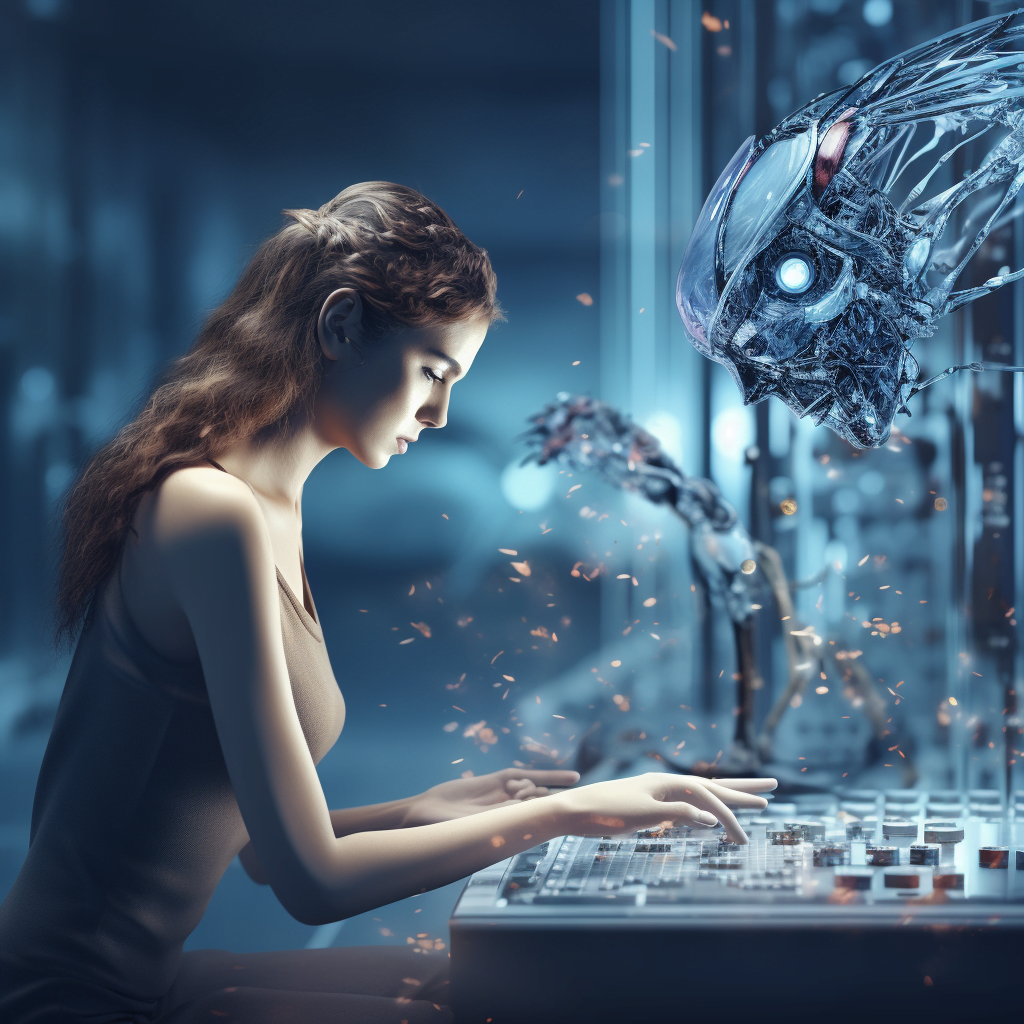In the realm of technology, Artificial Intelligence (AI) stands as a groundbreaking innovation that has already begun reshaping our world. The term, often affiliated with complex scientific theories and futuristic possibilities, is increasingly becoming an inseparable part of our day-to-day lives. Despite its increasing prevalence, AI’s fundamental concepts, operations, and implications often remain an enigma to many. This article aims to unravel the complexities of AI, offering a foundational understanding of its core elements.
Understanding AI Concepts
To commence our exploration, it is crucial to define AI. Simply put, AI is a multifaceted discipline within computer science dedicated to creating machines that mimic human intelligence. The objective is to enable machines to perform learning, problem-solving, perceiving, and decision-making tasks, which typically require human intelligence. Deciphering the jargon associated with AI is a crucial stepping stone toward understanding its functionality.
- Machine Learning (ML) is a subset of AI that focuses on developing systems that can learn from data, identify patterns, and make decisions with minimal human intervention.
- Deep learning, an advanced level of ML, uses artificial neural networks to imitate the functioning of the human brain, helping machines comprehend complex patterns in datasets.
- Neural Networks are intricate AI frameworks designed to mimic our brain’s structure and operation, thus enabling machines to learn from observational data.
- Natural Language Processing (NLP) is a sophisticated AI technique focused on interpreting and generating human language, allowing machines to communicate seamlessly with humans.
Artificial intelligence can be classified into three categories: Narrow AI, designed to perform specific tasks like voice recognition; General AI, which is capable of executing any intellectual task a human can (ChatGPT apps included); and Superintelligent AI, a futuristic concept where AI outperforms human capabilities in virtually every task.

AI Development and Functioning
AI functions are anchored on complex algorithms and computational models, facilitating tasks requiring human-like intelligence. Developing an AI model is a comprehensive process, encapsulating four stages.
Data Collection involves amassing vast quantities of relevant data, the foundational bedrock upon which AI operates. Data Processing involves cleaning, formatting, and structuring this collected data to ensure its optimal usability. Model Training incorporates the use of algorithms to enable the system to learn from the data and generate predictive models. Finally, Model Testing assesses the performance of these models, providing critical feedback necessary for further refining the AI system.
AI chatbots have emerged as a valuable tool in the field of AI, offering a wide range of use cases. These intelligent virtual assistants can understand and respond to user queries, providing personalized assistance and support. In AI research and development, chatbots can be utilized to facilitate conversations between researchers, aiding in knowledge sharing, collaboration, and problem-solving. They can also serve as conversational interfaces for AI systems, allowing users to interact with complex AI models more user-friendly and intuitively. Additionally, AI chatbots can assist in data analysis, helping researchers and data scientists extract insights from large datasets efficiently. With their versatility and adaptability, AI chatbots have become indispensable in advancing AI capabilities and enhancing the overall research and development process.
Algorithms, which are essentially detailed step-by-step instructions for completing specific tasks, play a pivotal role in AI, guiding the processes through which machines learn, adapt, and make decisions.
Check out AIBRB.COM, the number 1 resource for AI tools, where you can find the best 1000 tools developed using AI.
Application and Use Cases of AI
The applicability of AI is incredibly vast, permeating an array of sectors. In everyday life, AI is the driving force behind voice assistants like Siri and Alexa, personalized recommendations on e-commerce platforms, and the customized feeds we see on social media platforms.
In the business realm and diverse industries, the potential of AI is nothing short of monumental. In healthcare, AI algorithms are revolutionizing the landscape, predicting diseases, assisting in diagnosis, and personalizing patient treatment plans. The transportation industry taps into the power of AI for autonomous vehicles and efficient route mapping. The education sector leverages AI to personalize learning experiences, automate administrative tasks, and deliver innovative content.
Moreover, AI plays an indispensable role in data analysis and decision-making. It’s an invaluable asset for businesses to gain valuable insights, predict market trends, and enhance customer experiences.
Ethical Considerations in AI
As AI continues to seep into every facet of our lives, it brings to the forefront substantial ethical considerations. The potential of AI systems to perpetuate bias and discrimination is a significant concern. Such biases often mirror those in the data used to train these systems, leading to potentially unjust outcomes in fields like hiring, law enforcement, and lending.
Privacy and security concerns form another critical aspect of AI ethics. AI systems often require copious amounts of data, leading to questions about how this data is used, who has access to it, and how it is protected. As AI becomes more prevalent, it potentially opens the door to more advanced and sophisticated cybersecurity threats.

The Future of AI
With AI at the helm of technological advancement, we are on the brink of witnessing significant transformations in the future. Predictions include more sophisticated AI models, an upswing in automation levels, and increased accuracy in data analysis and predictions.
AI is also poised to impact future job markets significantly, possibly causing job displacement but simultaneously creating novel roles that didn’t exist before. Its societal impacts could be profound, leading to increased efficiency and productivity and raising issues around the digital divide and equitable access.
Conclusion
In today’s digital age, understanding the fundamentals of AI is not just an intellectual pursuit – it’s a necessity. As AI continues to evolve and expand its influence, our lives, careers, and societies will be shaped by it. By arming ourselves with a foundational understanding of AI, we can anticipate this imminent future, harnessing its potential benefits while mitigating potential risks.
References
Readers interested in diving deeper into AI are encouraged to peruse academic articles, authoritative blogs, and textbooks. These sources can offer a wealth of detailed information, fueling further exploration and understanding of this riveting field.
Frequently Asked Questions (FAQs) About Artificial Intelligence
- What is Artificial Intelligence (AI)?
Artificial Intelligence (AI) is a discipline within computer science focused on creating machines capable of mimicking human intelligence. AI systems are designed to perform tasks that usually require human intellect, such as learning from experience, recognizing patterns, understanding languages, and making decisions.
- What are the critical branches of AI?
There are several branches within AI, including Machine Learning (ML), which allows systems to learn and improve from experience; Deep Learning, which utilizes artificial neural networks to mimic human thought processes; and Natural Language Processing (NLP), which enables machines to understand and generate human language.
- What is the difference between Narrow AI, General AI, and Superintelligent AI?
Narrow AI refers to AI systems designed to perform specific tasks, such as voice recognition. General AI, although currently theoretical, relates to systems that possess the ability to perform any intellectual task that a human being can. Superintelligent AI, also theoretical at this point, refers to future systems that surpass human intelligence and capability.
- How does AI work?
AI works through gathering data, processing that data, training a model using algorithms, and testing and refining the model. At the heart of AI is the algorithm, which is essentially a set of rules or instructions that the AI system follows to achieve its task.
- How is AI used in everyday life?
AI is used in various applications that many people use daily. Examples include voice assistants like Siri or Alexa, personalized recommendations on streaming and e-commerce platforms, autocorrect phone features, and personalized social media feeds.
- What are some ethical issues related to AI?
AI raises several ethical issues, including bias and discrimination, privacy and data security, and job displacement. AI systems can reflect and amplify existing human biases if the data used to train them is biased. With AI systems often needing large amounts of data, there are concerns about how this data is used and protected. Additionally, as AI leads to increased automation, it could lead to job displacement in specific sectors.
- What is the future of AI?
The future of AI holds the potential for significant advancements and transformations. It is predicted to result in more sophisticated AI models, increased automation, more accurate data analysis and decision-making, and significant impacts on job markets and societal structures. However, the future of AI also presents challenges that need to be addressed, such as ethical considerations and the digital divide.